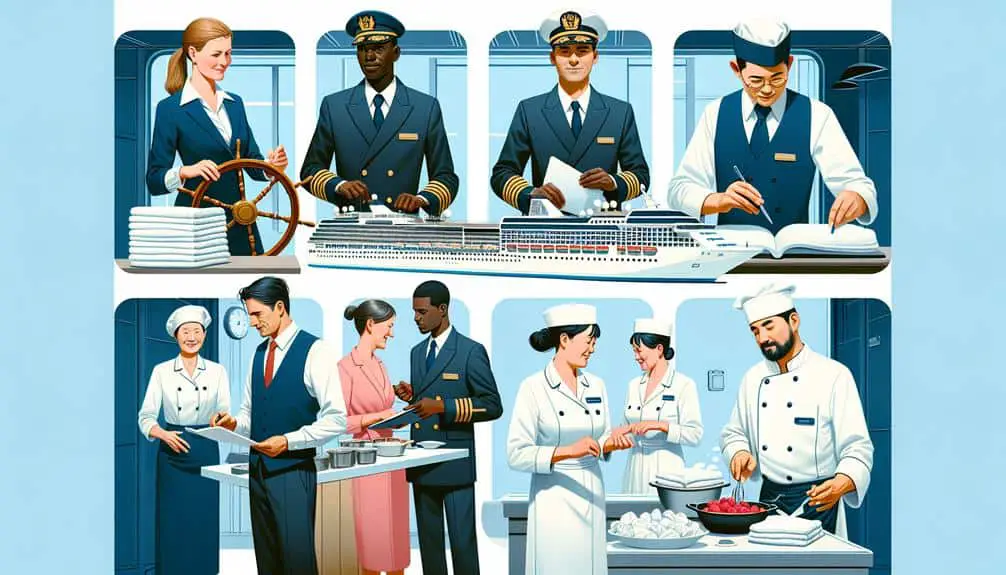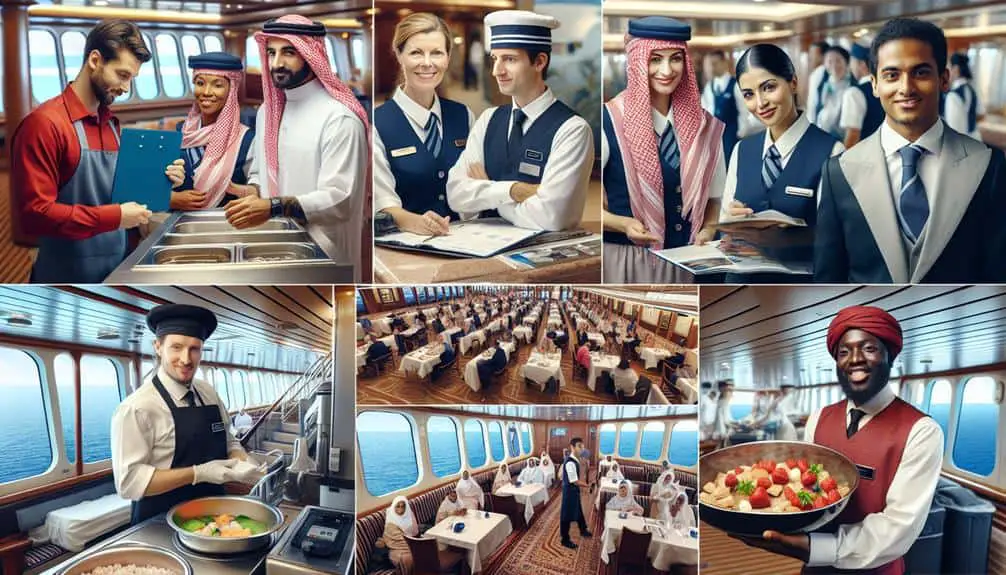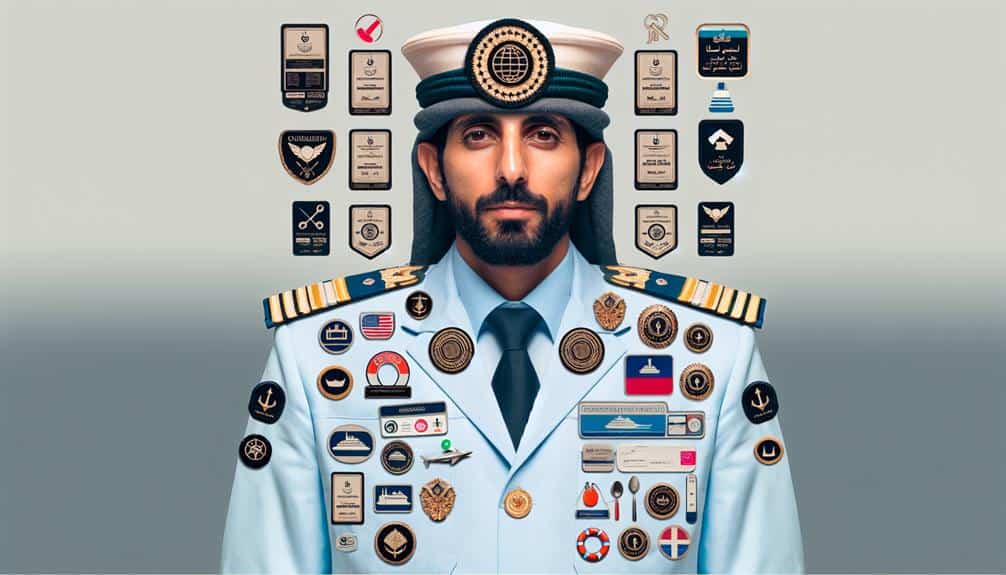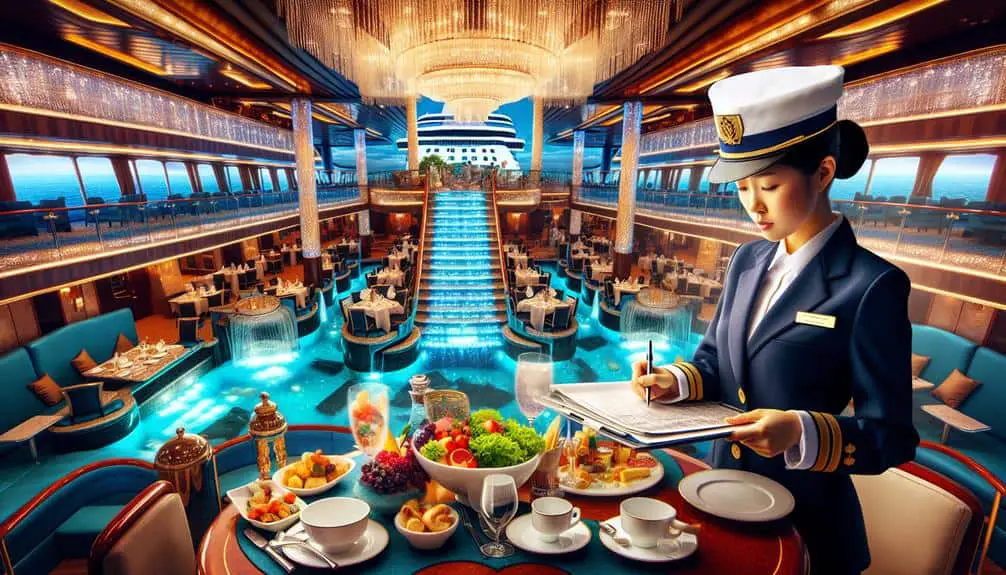Step into the intricately woven tapestry of crew roles on a cruise ship. From the unwavering guidance of the Captain and Officers to the meticulous safety maintenance by the Deck Department, every role is essential. The Engine Department keeps the vessel running smoothly, while the Hotel Department guarantees your comfort and well-being. The Entertainment and Service Staff work tirelessly to offer excellent customer service and engaging experiences. Each position plays a pivotal part in your journey. Explore the fascinating world of cruise ship crew roles to gain a deeper insight into the exceptional teamwork that creates your unforgettable voyage.
Key Points
- Captain and Officers ensure safe navigation and compliance with laws.
- Deck Department maintains ship's exterior areas and implements safety procedures.
- Engine Department drives the vessel, monitors fuel consumption, and ensures safety.
- Hotel Department maintains cleanliness, provides guest services, and enhances comfort.
- Entertainment and Service Staff deliver exceptional customer service, coordinate entertainment, and prioritize safety.
Captain and Officers
In overseeing the operations of the cruise ship, the Captain and Officers guarantee meticulous navigation and adherence to safety protocols at all times. As leaders onboard, they bear the pivotal responsibility of ensuring the vessel's safe passage through the waters. Navigation responsibilities fall squarely on their shoulders, requiring a deep understanding of charts, weather patterns, and maritime laws. The Officers, under the Captain's guidance, play a critical role in executing these navigational duties with precision and expertise.
Safety protocol is paramount in their daily routine. The Captain and Officers meticulously enforce and uphold stringent safety measures to safeguard passengers, crew, and the ship itself. Their communication strategies are clear and effective, ensuring seamless coordination during emergencies or routine operations. Through regular drills and training sessions, they prepare the crew to respond swiftly and decisively in any situation that may arise.
In their leadership roles, the Captain and Officers exemplify professionalism and dedication, setting the standard for excellence in maritime operations.
Deck Department
The Deck Department meticulously maintains the ship's exterior areas to guarantee safety and operational efficiency. Safety procedures are carefully followed to make sure the well-being of passengers and crew. Deck officers oversee navigation responsibilities, including charting the ship's course, monitoring weather conditions, and communicating with other vessels. They're responsible for the safe passage of the ship from port to port, following strict protocols and international maritime regulations.
Deck crew members play an important role in implementing safety drills, such as man overboard procedures and fire drills, to prepare for any potential emergencies. They're trained to handle life-saving equipment and are ready to respond swiftly to any crisis that may arise while at sea. Additionally, the Deck Department is in charge of maintaining lifeboats, life rafts, and other safety equipment to make sure they're always in optimum condition.
Engine Department
Within the intricate workings of a cruise ship, the Engine Department stands as the powerhouse that drives the vessel forward with precision and reliability. Engine maintenance is a critical aspect of the department's responsibilities. The team meticulously follows maintenance schedules, conducts thorough inspections, and promptly addresses any issues to guarantee performance and safety at sea.
Fuel efficiency is a key focus for the Engine Department. The crew monitors fuel consumption, adjusts settings for maximum efficiency, and implements eco-friendly practices to minimize the ship's environmental impact. By fine-tuning engine operations and adopting innovative technologies, the department plays an essential role in reducing fuel consumption and overall operating costs.
Safety is paramount in the Engine Department. Crew members undergo rigorous training to handle emergencies, follow strict protocols to prevent accidents, and prioritize the well-being of passengers and crew. Their expertise, dedication to maintenance, and commitment to fuel efficiency contribute significantly to the smooth operation and sustainability of the cruise ship.
Hotel Department
Maintenance diligence characterizes the important responsibilities of the Hotel Department aboard a cruise ship. Housekeeping management is essential to ensuring that all guest cabins and public areas are kept clean and sanitized to the highest standards. From changing linens to replenishing amenities, the housekeeping team plays a crucial role in maintaining a comfortable and hygienic environment for passengers.
Room service is another key aspect of the Hotel Department, providing guests with meals and beverages in the comfort of their cabins. This service requires coordination between the kitchen staff, servers, and logistical personnel to ensure timely delivery and quality presentation.
Front desk operations are at the forefront of guest interactions, handling check-ins, check-outs, and addressing any concerns or requests promptly and professionally. The concierge services offered by the Hotel Department provide guests with information about excursions, dining options, and onboard activities, enhancing their overall experience.
Entertainment and Service Staff
Exemplifying exceptional customer service and delivering engaging entertainment, the Entertainment and Service Staff on a cruise ship play integral roles in enhancing passengers' onboard experience. These dedicated professionals are responsible for a range of tasks that guarantee guest interactions are memorable and performances are outstanding.
In the domain of entertainment, this staff oversees talent management, coordinating schedules, rehearsals, and performances. They work tirelessly to create enthralling shows and events that cater to diverse passenger preferences. Additionally, they're adept at engaging with guests during activities, fostering a lively and enjoyable atmosphere onboard.
On the service front, the Entertainment and Service Staff prioritize customer satisfaction by responding promptly to inquiries, resolving issues, and anticipating guest needs. Their attention to detail and focus on safety protocols contribute to a seamless and secure environment for passengers to relax and enjoy their cruise experience.
Through their combined efforts in guest interactions, performance management, talent coordination, and service excellence, the Entertainment and Service Staff elevate the overall quality of the cruise journey for all onboard.
Frequently Asked Questions
Are Crew Members Allowed to Socialize With Passengers Outside of Their Work Duties?
Yes, crew members can socialize with passengers outside of their work duties. Establishing clear boundaries and maintaining professionalism is essential. Balancing work and personal interactions is key to fostering positive crew relationships while ensuring guest satisfaction.
What Kind of Training Do Crew Members Undergo Before Working on a Cruise Ship?
Before working on a cruise ship, crew members undergo rigorous safety protocol training and must meet certification requirements. They also receive cultural sensitivity training and are assessed on language proficiency to guarantee effective communication with passengers.
How Do Crew Members Handle Emergencies or Medical Situations on Board?
In times of crisis at sea, crew members swiftly implement emergency protocols, ensuring passenger safety. Trained in crisis management and medical care, they handle emergencies with precision and professionalism, prioritizing the well-being of all onboard.
Are Crew Members Able to Explore Ports of Call During Their Free Time?
While crew members enjoy some free time, exploring restrictions are in place to guarantee safety and adherence to duty schedules. Crew privileges may vary but must align with operational needs and safety protocols.
How Do Crew Members Cope With Being Away From Their Families for Extended Periods of Time?
You cope with time away from family by developing a routine, staying connected through calls and messages, and finding support among colleagues. Prioritizing mental health, communication, and seeking help when needed are essential.




